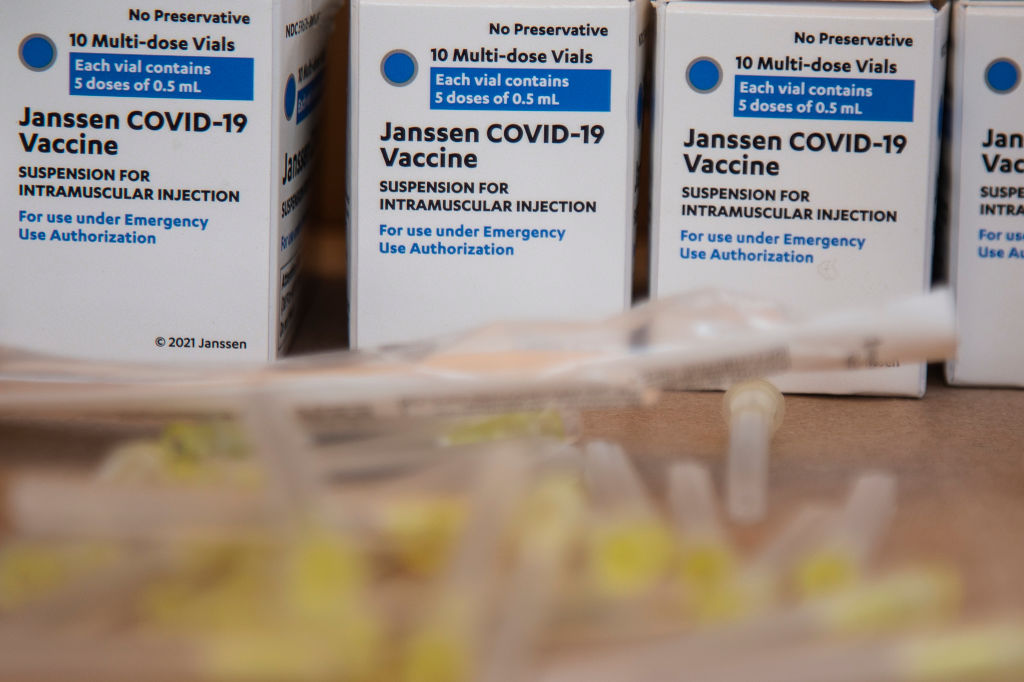
Johnson & Johnson’s Covid-19 vaccine now carries a warning of a possible rare neurological side effect. The problem can be treated but the update marks the second safety issue flagged for the vaccine in the past three months.
The new potential side effect is Guillain-Barré syndrome, a rare reaction that prompts the immune system to attack nerves, leading to muscle weakness and in some cases, paralysis.
The Johnson & Johnson vaccine fact sheet provided to clinicians was updated Monday to state that reports of adverse events following vaccination suggest an increased risk of Guillain-Barré within 42 days of receiving the injection. According to an FDA update on Tuesday, there have been 100 preliminary reports of the syndrome out of about 12.5 million administered doses of the J&J COvid vaccine. A total of 95 of those cases were serious and required hospitalization; one death was reported.
It’s important to note that federal health authorities have not found a causal link between J&J’s vaccine and the reports of Guillain-Barré. Anyone may develop Guillain-Barré, which affects an estimated 3,000 to 6,000 people annually, according to the Centers for Disease Control and Prevention.
The syndrome can follow infection by a virus or bacteria. It has also been observed as a side effect of some drugs and vaccines, including vaccines for the flu and shingles.
The J&J Covid vaccine, developed by the company’s Janssen subsidiary, employs an adenovirus, the virus that causes the common cold. That virus has been engineered so it’s not infectious but can still carry out the task of delivering a payload of genetic material into cells. Cells use that material to make the copies of the novel coronavirus’s spike protein, which prompt the immune system to produce antibodies. It’s a different approach than the one used by messenger RNA vaccines, which reach their cellular targets via lipid nanoparticles. Guillain-Barré has not been reported with the mRNA Covid vaccines.

A Deep-dive Into Specialty Pharma
A specialty drug is a class of prescription medications used to treat complex, chronic or rare medical conditions. Although this classification was originally intended to define the treatment of rare, also termed “orphan” diseases, affecting fewer than 200,000 people in the US, more recently, specialty drugs have emerged as the cornerstone of treatment for chronic and complex diseases such as cancer, autoimmune conditions, diabetes, hepatitis C, and HIV/AIDS.
According to the Mayo Clinic, treatment for the syndrome includes plasmapheresis, or plasma exchange, as well as immunoglobulin therapy, which consists of an infusion of healthy antibodies from a blood donor. Most of those who develop Guillain-Barré fully recover though some people experience permanent nerve damage, the CDC said. The FDA said that it has reviewed the available information for the J&J vaccine and it reiterated that the benefits of the shot outweigh the known and potential risks.
J&J issued a statement acknowledging the Guillain-Barré risk.
“We strongly support raising awareness of the signs and symptoms of rare events to ensure they can be quickly identified and effectively treated,” the statement read in part.
The updated vaccine information warns patients to watch for symptoms that include weakness or tingling sensations, particularly in legs or arms, that worsens and spreads to other parts of the body; difficulty walking; double vision or inability to move the eyes; and incontinence.
The new caution about Guillain-Barré follows reports in the spring about blood clots associated with the Johnson & Johnson vaccine. The FDA and CDC temporarily paused use of the vaccine in April while an inquiry evaluated the safety risks. On April 23, the order authorizing emergency use of the vaccine was amended to flag an increased risk of blood clots in the brain and elsewhere in the body, with symptoms developing within one to two weeks after vaccination.
Photo: Francisco Vega, Getty Images













